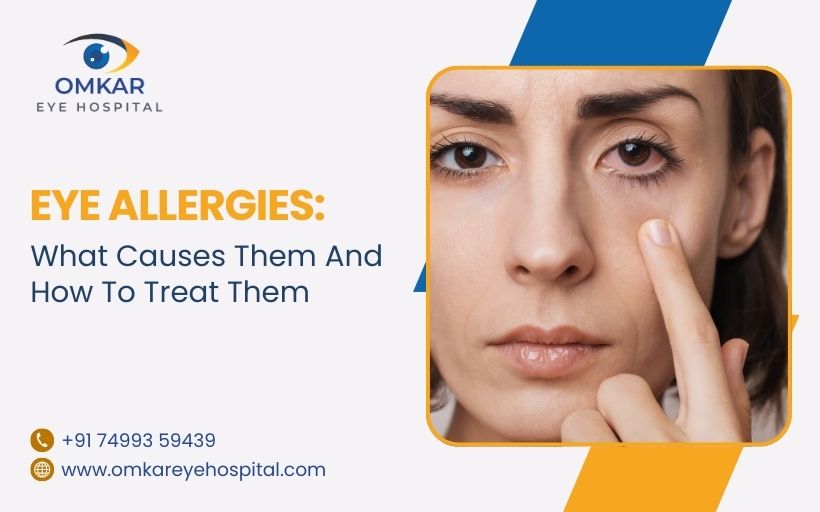They occur when allergens such as dust, mold, pollen, or pet dander trigger an allergic reaction in the eyes. Eye allergies can result in red, itchy, watery, and swollen eyes, as well as pain.
It's critical to understand the origins of eye allergies and effective management techniques if you experience them. Explore the causes, symptoms, and treatments of eye allergies, as well as how to find the best ophthalmologists in Chinchwad, Pune, for personalized care in this blog.
What Are Eye Allergies?
Eye allergies, commonly known as allergic conjunctivitis, occur when your immune system overreacts to an allergen. The eyes, being highly sensitive, can become inflamed and irritated when exposed to allergens, triggering symptoms such as itching, redness, and watering. Allergic conjunctivitis is a common condition, particularly during seasonal changes or in urban environments with high levels of pollution.
Common Causes of Eye Allergies
Pollen: Pollen is one of the most common allergens, especially during spring or fall. Pollen from trees, grasses, and weeds can cause seasonal allergic conjunctivitis.
Dust Mites: These tiny creatures thrive in dust and can trigger eye allergies, especially in indoor environments like bedrooms and living rooms.
Pet Dander: For sensitive individuals, proteins in a pet's skin cells, saliva, and urine can trigger allergic reactions, resulting in symptoms such as itchy eyes.
Mold Spores: Molds that grow in damp areas of the home can release spores that trigger allergies in individuals sensitive to mold, causing eye irritation.
Air Pollution: Smog, smoke, and exhaust fumes are among the pollutants that can exacerbate eye allergies, making cities especially difficult for those who are sensitive.
Cosmetics and Fragrances: Some individuals may develop allergies to ingredients in eye makeup or scented lotions, which can lead to irritation or swelling around the eyes.
Symptoms of Eye Allergies
The symptoms of eye allergies vary from mild to severe, depending on the allergen and your sensitivity. Common symptoms include:
- Itchy Eyes: This is the most common symptom, making it difficult to resist rubbing the eyes.
- Red or Pink Eyes: The eyes may appear red or bloodshot due to inflammation in the blood vessels.
- Watery Eyes: Increased tear production is the body’s way of flushing out allergens.
- Swollen Eyes: Puffiness or swelling around the eyes, especially in the morning, is a common sign of eye allergies.
- Blurred Vision: In some cases, excessive watering can lead to temporary blurred vision.
If you’re experiencing any of these symptoms, visiting a trusted eye specialist in Chinchwad can help diagnose the problem and provide the right treatment options.
How to Treat Eye Allergies
Managing eye allergies involves identifying the triggers and taking steps to reduce exposure. Treatment options depend on the severity of symptoms and the specific allergens involved.
1. Avoiding Allergens
The first step in managing eye allergies is to reduce exposure to allergens. Here are some tips to help you avoid common triggers:
- Stay Indoors During Pollen Season: If you're allergic to pollen, try to stay indoors during high pollen seasons, especially early in the morning and on windy days.
- Keep Windows Closed: Use air conditioning instead of opening windows during allergy season to keep pollen and dust out of the house.
- Wash Bedding and Furniture Regularly: Dust mites thrive on bedding and upholstered furniture, so washing these items in hot water and vacuuming regularly can help reduce allergens.
- Pet Care: If you’re allergic to pet dander, bathe and groom your pets frequently, and keep them out of your bedroom.
2. Medications for Eye Allergies
Over-the-counter (OTC) medications can be effective for mild eye allergies when prescribed by your doctor. However, for more severe cases, you may need a prescribed medication. Common medications include:
- Antihistamines: These medications can block the effects of histamines, which cause allergy symptoms. They are available in both oral and eye-drop forms.
- Decongestants: Decongestant eye drops can help reduce swelling in the eyes, making them feel less irritated.
- Steroid Eye Drops: These are prescribed for severe eye allergies and work by reducing inflammation in the eyes.
- Artificial Tears: These eye drops help lubricate the eyes, providing relief from dryness caused by allergies.
Always consult an eye specialist before using any medication, as they can guide you in selecting the right treatment based on your symptoms and health conditions.
3. Eye Allergy Immunotherapy (Allergy Shots)
For people with chronic or severe eye allergies, allergy shots or immunotherapy may be an option. These shots gradually desensitize the immune system to specific allergens over time, providing long-term relief. If you suffer from persistent eye allergies, discuss this option with a trusted ophthalmologist. If you are looking for a trusted eye specialist in Chinchwad, Omkar Eye Hospital is your go-to destination.
4. Use of Cold Compresses
Itching and swelling in your eyes can be immediately reduced by applying a cold compress. For ten to fifteen minutes, cover your closed eyelids with a fresh cloth soaked in cold water.
5. Consulting the Best Ophthalmologists in Chinchwad, Pune
If your symptoms persist despite trying over-the-counter treatments, it's time to seek professional help. Omkar Eye Hospital, known for its excellent eye care services, offers advanced treatments for eye allergies. Dr. Nilesh Kakade, one of the best ophthalmologists in Chinchwad, Pune, will assess your condition and recommend the most effective treatments personalized to your needs.
6. Allergen Avoidance Measures at the Eye Clinic
When you visit an eye clinic, you may be advised to undergo allergy testing to determine the specific triggers causing your symptoms. Based on the results, the ophthalmologist will provide personalized advice on managing and preventing future flare-ups.
When to See a Doctor
While most eye allergies can be managed at home, you should consult a doctor if:
- Your symptoms persist despite using OTC treatments.
- You experience severe redness, pain, or vision changes.
- You have other allergic reactions, such as skin rashes or difficulty breathing.
- You have a history of asthma or other respiratory issues, as eye allergies can sometimes worsen other allergic conditions.
The best eye specialist will perform a thorough examination to determine the cause of your symptoms and provide an appropriate treatment plan. It's always better to seek professional advice if you're unsure about the severity of your condition.
Conclusion
Eye allergies can be disruptive, but with the right approach, you can manage the symptoms effectively. From avoiding allergens to using medications, there are different ways to find relief.
If you’re struggling with persistent eye allergies, feel free to schedule a consultation with our expert, Dr. Nilesh Kakade, one of the most trusted eye specialists in Chinchwad. We provide you with specialized care personalized to your needs.


